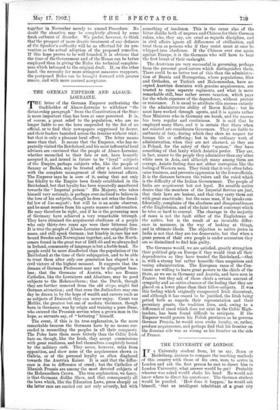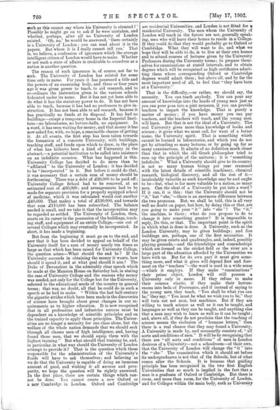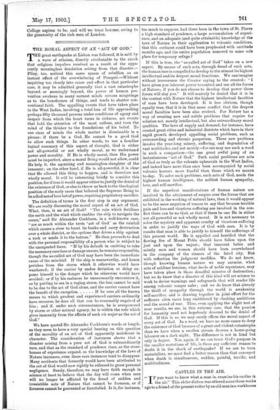THE UNIVERSITY OF LONDON.
IF a University student from, let us say, Bonn or Heidelberg, anxious to compare the teaching method's of this country with those of his own, were to arrive ih London and ask the first person he met to direct him to London University, what answer would he get? Probably whoever was asked would shako his head: He would not know where to direct his questioner. The German student would be puzzled. How does it happen,' he would ask himself, that an intelligent inhabitant of a great city such as this cannot say where his University is situated ? ' Possibly he might go on to ask if he were mistaken, and whether, perhaps, after all no University of London existed. Oh, no,' he would be answered, there certainly is a University of Loudon : you can read about it in the papers. But where it is I really cannot tell you.' That is, we believe, a confession of ignorance which the average intelligent citizen of London would have to make. Whether or not such a state of affairs is creditable to ourselves as a nation is another question.
The reason of such ignorance is, of course, not far to seek. The University of London has existed for some time only in name. For years it has possessed a title and the powers of an examining body, and three or four years ago it was given power to teach, to aid research, and to co-ordinate the instruction given in the various schools federated under its name. But it has not yet been able to do what it has the statutory power to do. It has not been able to teach, because it has had no professors to give in- struction. It has not been able to aid research, because it has practically no funds at its disposal. It has had no buildings—except a temporary home in the Imperial Insti- tute—no laboratories, no lecture-halls, no equipment. In a word, it has been waiting for money, and that money it has now asked for, with, we hope, a reasonable chance of getting it. At all events, the first step has been taken towards the formation of a concrete University, with buildings, teaching staff, and funds upon which to draw, in the place of what has hitherto been a kind of University in the abstract,—a potential institution to be called into existence on an indefinite occasion. What has happened is this.
University College has decided to do more than be " affiliated " to the University of London ; it has decided to be " incorporated " in it. But before it could do that, it was necessary that a certain sum of money should be forthcoming. There was a debt of £30,000 to be paid off ; University College School had to be removed, at an estimated cost of £60,000 ; and arrangements had to be made for separate provision for a properly equipped school of medicine, which it was calculated would cost another X40,000. That makes a total of £130,000, and towards that sum £110,000 has been subscribed. The balance needed is small, and we take it that the incorporation may be regarded as settled. The University of London, then, starts on its career in the possession of the buildings, teach- ing staff, and equipment of an entire College,—one out of several Colleges which may eventually be incorporated. In short, it has made a beginning.
But from the beginning it must go on to the end, and now that it has been decided to appeal on 'behalf of the University itself for a sum of money nearly ten times as large as that which has been raised for University College, the question arises—What should. the end be ? If the University succeeds in obtaining the money it wants, how should it spend it, and at what goal should it aim ? The Duke of Devonshire in the admirably clear speech which he made at the Mansion House on Saturday last, in stating the case of University College and the reasons why money was needed, not only for the College but for the University, referred to the educational needs of the country in general terms ; that was, no doubt, all that he could do in such a speech as he had to make. " Within the last half-century the gigantic strides which have been made in the discoveries of science have brought about great changes in our re- quirements as to higher education. It is now recognised that in all professions and industries success must be dependent on a knowledge of scientific principles and on the trained capacity to apply those principles. The Univer- sities are no longer a necessity for one class alone, but the welfare of the whole nation demands that we should seek through all classes men of high intelligence, and, having found those men, that we should equip them with the highest training." But what should that training be, and, in particular, in what way should the University of London attempt to provide it ? That is the question which those responsible for the administration of the University's funds will have to ask themselves ; and believing as we do that the University is capable of doing an immense amount of good, and wishing it all success and pros- perity, we hope the question will be rightly answered. In the first place, there are certain things which can- not be done. You cannot create a new Oxford or are residential Universities, and London is not fitted for a. residential University. The men whom the University of London will teach in the future are not, generally speak- ing, men who will leave their homes to reside in a College. If they could do that they would probably go to Oxford or Cambridge. What they will want to do, and what we hope they will be able to do, is to live at their own homes and to attend courses of lectures given by the University Professors during the University terms ; to prepare them- selves for examinations at stated intervals, and to obtain degrees which will be recognised as high certificates admit- ting them where corresponding Oxford or Cambridge degrees would admit them ; but above all, and by far the most important need of all, to feel that " they have been at a University."
That is the difficulty,—or rather, we should say, the necessity. You can teach anybody. You can pour any amount of knowledge into the heads of young men just as you can pour peas into a pint measure, if you can provide teachers to impart the knowledge. That is purely • a matter of money ; if you have money you can pay teachers, and the teachers will teach, and the young men will learn. But that is not the ideal of a University. The real University gives more than knowledge of books and science ; it gives what we must call, for want of a better name, the University spirit. That is something whieh cannot be learned in laboratories, and which you do not get by attending so many lectures, or by going up for so many examinations. It admits of no definition much closer than that in which the old Greek philosopher tried to sum up the principle of the universe ; it is "something indefinite." What a University should give to its country is not so many human beings per year crammed with the latest details of scientific machinery, chemical research, biological discovery, and all the rest of it— incalculably valuable as such knowledge may be and ought to be—but, what is far more valuable to a nation, so many men. Can the ideal of a University be put into a word ? If it can, it is this : that the University should not be "it," but "she,"—there is an enormous difference between the two pronouns. But, we shall be told, this is all very well no doubt on paper, but how, by doing this or that, are you going to make your " it " into " she " ? The " it," the machine, is there ; what do you propose to do to change it into something greater ? It is impossible to reply, Do this, or that. The important point is the spirit in which what is done is done. A University, such as the London University, may be given buildings ; and fine buildings are, perhaps, one of the first necessities. It may be given courts and quadrangles, and, indeed, possibly playing grounds,—and the friendships and comradeships which are formed on the cricket field. or the river are a large part of the education afforded by the Universities we have with us.. But for its own part it must give some- thing more, and what it gives will depend first and fore- most on the " teachers "—the word is used in a wide sense —which it employs. If they make " examinations " their prime object, London will still possess a University only in name. If they refuse to make their courses elastic, if they make their lecture- rooms into beds of Procrustes, and if instead of saying to the young men they teach, " You shall be what you can be," they say, " You must be what we wish you to be," they will turn out not men, but machines. But if they are willing to teach science as well as it can be taught, and languages as well as they can be taught, and anything else that a man may wish to learn as well as it can be taught ; and, above all, if they do not proclaim that the teaching of science means the exclusion of " humane letters," then there is a real chance that they may found a University. A University is made by, and necessarily consists of, " all sorts and conditions of men." It will be by recognising that there are " all sorts and conditions " of men in London desirous of a Univei.sity—not a schoolroom—of their own, that the University of London will change the " it " into the " she." The examination which it should set before its undergraduates is not that of the Schooli, but'of what comes after the Schools. It is because that guiding principle has been recognised in the two first English Universities that so much is implied in the fact that a man is a graduate of Oxford or Cambridge. But there is room, and more than room, for the University of Londdn, a new Cambridge in London. Oxford and Cambridge and for Colleges within the main body, such as University College aspires to be, and will we trust become, owing to the generosity of the rich men of London.








































 Previous page
Previous page